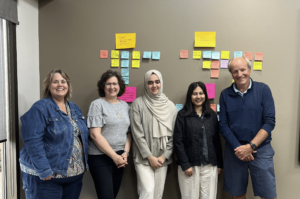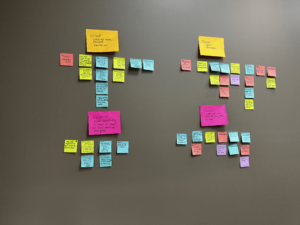|
Getting your Trinity Audio player ready...
|
Beyond Diversity: The Cultural Shift Needed to Empower Women in Leadership
 Despite increased attention to Equity, Diversity, Inclusion, and Accessibility (EDIA), women from underrepresented groups, such as racialized women, Indigenous women, women with disabilities, immigrant women, as well as non-binary people and trans women, continue to face barriers in attaining leadership roles across various sectors, including non-profit, public, and corporate environments.
Despite increased attention to Equity, Diversity, Inclusion, and Accessibility (EDIA), women from underrepresented groups, such as racialized women, Indigenous women, women with disabilities, immigrant women, as well as non-binary people and trans women, continue to face barriers in attaining leadership roles across various sectors, including non-profit, public, and corporate environments.
Capacity Canada’s Open Hearth project aims to increase the presence of underrepresented women in leadership and decision-making roles within the nonprofit sector. In a series of stakeholder interviews, we have been asking women leaders about their experience in advancing nonprofit equity and what they have learned along the way. During these conversations, we heard about the important role organizational culture plays in determining not only the entry of women into leadership positions but also their long-term success in these roles.
Organizational culture is the set of values, beliefs, attitudes, systems, and rules that outline and influence employee behaviour within an organization. Research has shown that 77% of workers consider company culture before applying for jobs, and nearly half would leave a position for one that offers a better cultural fit.[1] Thus, culture plays a fundamental role in employee satisfaction and retention, and for women aiming for leadership positions, it can either act as a barrier or provide a foundation for growth.
The nonprofit, public and corporate sectors have developed initiatives and programs to advance EDIA but more needs to be done to generate momentum around these change efforts and to understand their longer-term impact. We have learned that initiatives often fall short in addressing deeply rooted cultural and structural barriers that prevent women from thriving once they have attained leadership positions.
Women leaders we spoke to talked about their encounters with entrenched cultural biases, where diversity was seen as a mere obligation rather than a genuine asset. As a result, women, particularly those from underrepresented groups, reported struggling with a lack of inclusion and a genuine sense of belonging, making it difficult for them to thrive in leadership positions.

Further, the interviews revealed that many women faced significant work-life balance challenges, particularly in environments that viewed family commitments—such as parenting—as incompatible with leadership. Rigid organizational structures and inflexible work policies exacerbated this issue, limiting women’s ability to balance professional aspirations with personal responsibilities. This perception was often compounded by societal stereotypes about women’s leadership capabilities.
Interviewees also emphasized the interdependent relationship between individual and organizational culture. Several women shared that their success in leadership was directly tied to the support they received from mentors and colleagues. However, when key supporters left the organization, their progress stalled, highlighting how leadership advancement can be fragile and dependent on individual relationships rather than embedded within the organizational culture.
To create lasting change, organizations must shift from focusing solely on diversity numbers to fostering a culture of inclusion and belonging that allows women to truly thrive. Leadership must take an active role in driving this change by aligning values with actions, promoting transparency, and ensuring that diversity and inclusion are integral to all organizational systems. Moreover, leaders and managers need to ensure that changes resonate with the needs of the entire team. This leads to smoother transitions and better acceptance; helping staff see where they fit and how they can help support ongoing efforts to create more equitable and inclusive workplaces.
Mentorship programs, flexible work policies, and structural reforms are crucial in supporting women’s leadership, but they must be part of a broader cultural shift that addresses intersectionality, work-life balance, existing power dynamics and the stereotypical definition of leadership. Only by creating a truly inclusive environment can organizations ensure that women from all backgrounds not only access leadership roles but succeed and lead effectively.
In the coming months, the Open Hearth project will be working with underrepresented women to co-design a culture change framework that will be tested and refined with nonprofits in Waterloo Region. In year two of the project, the culture change framework will be introduced to nonprofit organizations in St. John’s, NL and Calgary, AB. To learn more about the project, visit Open Hearth; or get in touch with us if you are interested in becoming a project participant.
Written by: Fableeha Choudhury, Project Manager, Open Hearth Project, Capacity Canada & Fatima Awan, Project Assistant, Open Hearth Project, Capacity Canada

